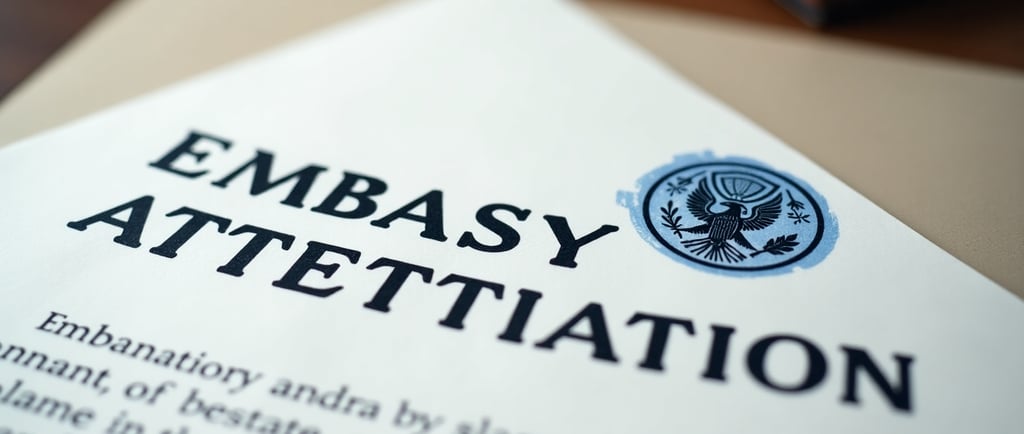The Importance of Embassy Attestation: The Final Step to Authentication
7/24/20254 min read


Understanding Embassy Attestation
Embassy attestation is a critical process in the verification of documents intended for use in foreign jurisdictions. It refers to the formal approval by an embassy or consulate that verifies the authenticity of documents so that they may be accepted by foreign authorities. This procedure serves as a crucial final step in the broader document authentication process, which typically includes prior verification from local authorities or notary public before the documents are presented to the embassy. The significance of embassy attestation cannot be overstated, as it assures foreign entities that the documents were issued by legitimate organizations and hold legal standing.
Typically, a wide array of documents necessitates embassy attestation. Among these are educational certificates, which include diplomas and transcripts required for higher education or employment purposes abroad. Additionally, marriage certificates are often required for spousal visas or residency permits in foreign countries, making their attestation paramount. Business documents, such as incorporation certificates or contracts, are also frequently submitted for embassy attestation to facilitate international trade and business dealings. By having these documents attested, individuals and businesses can ensure they comply with the legal requirements of the host country.
Moreover, embassy attestation enhances the credibility of a document, reducing the likelihood of disputes regarding its authenticity. Different countries may have various requirements and procedures for document attestation, emphasizing the importance of understanding the specific demands of the target nation. Therefore, individuals and organizations seeking to utilize documents in a foreign context must be diligent in obtaining embassy attestation, as it represents the culmination of the document verification process. Such due diligence not only fosters smoother exchanges but also instills confidence in the parties involved.
The Role of Embassy Attestation in International Transactions
Embassy attestation serves a pivotal role in the landscape of international transactions, ensuring that documents are authenticated and recognized across borders. This process typically involves the verification of various personal and professional documents including educational certificates, employment records, and legal agreements. For individuals seeking opportunities to study abroad or work overseas, embassy attestation becomes a fundamental requirement. Educational institutions and employers in foreign countries often require proof of authenticity for any submitted documents. Without this crucial layer of verification, individuals may face serious setbacks in their educational and professional pursuits.
Moreover, in international business dealings, embassy attestation provides essential security and trust in cross-border transactions. Businesses often engage in partnerships or contracts with foreign entities, necessitating the authentication of relevant documents to mitigate risks associated with fraud. By having documents attested by the appropriate embassy, companies can assure their partners and clients that all provided information is legitimate and credible. This enhances confidence in conducting business internationally and can significantly reduce the likelihood of financial losses due to fraudulent activities.
The process of embassy attestation also effectively safeguards both individuals and organizations by establishing a standardized method of verifying documentation. This standardization is particularly vital given the disparate legal frameworks and standards that govern various countries. By adhering to the attestation process, individuals and businesses ensure compliance with international norms, thereby facilitating smoother transactions and interactions across borders. The significance of embassy attestation cannot be overstated; it ultimately serves as a protective measure that bolsters the integrity of cross-border activities, promoting a secure environment for all parties involved.
The Embassy Attestation Process: Steps and Requirements
Embassy attestation serves as a critical step in the authentication of documents required for various purposes abroad, including employment, education, and legal matters. The process generally consists of several distinct stages, each requiring specific documents and adherence to guidelines set by the respective embassy or consulate.
To begin the embassy attestation process, it is essential to prepare the documents to be attested. Typically, essential documents include academic certificates, marriage certificates, and power of attorney. It is advisable to ensure that the original documents are in good condition and any necessary notarization takes place before submission. Alongside the originals, applicants may need to provide photocopies and, in some instances, a government-issued identification document.
The next step involves filling out the application form provided by the embassy, which varies depending on the country. During this stage, it is crucial to accurately complete the form and provide all requested information to avoid any delays. Additionally, applicants will typically need to pay a processing fee, which can vary widely. As fees can sometimes be substantial, individuals should verify the exact amount beforehand to ensure compliance with the embassy's requirements.
After submitting the application and payment, expect processing times to vary considerably based on the embassy’s workload and specific document type. Generally, the processing of embassy attestation can take anywhere from a few days to several weeks. To expedite the process, applicants may consider calling the embassy for updates, or determining if expedited services are available for urgent needs.
Challenges such as missing documents or higher-than-expected fees can arise during the attestation process. Preparation is key; individuals should thoroughly review embassy guidelines and contact the office for clarification on any uncertainties. Choosing the appropriate embassy or consulate is vital, as each institution may have slightly different requirements and timelines, impacting the overall efficiency of the embassy attestation process.
Conclusion: Why Embassy Attestation is Indispensable
Embassy attestation serves as a critical and ultimate step in the document verification process. Its significance lies in the confirmation of a document's authenticity, which is essential for both individuals and businesses engaging in international endeavors. Throughout this discussion, we have explored the various reasons that underline the necessity of this procedure. The legitimacy of documents can significantly impact one's ability to operate effectively across borders, whether for educational, professional, or legal purposes.
Firstly, the power of embassy attestation is rooted in its formal recognition by foreign governments. This action ensures that the involved documents are not only authentic but also comply with the legal requirements of the destination country. Without this crucial verification, individuals may face various challenges, such as delays in visa processing or, even worse, the rejection of applications altogether.
Furthermore, businesses looking to expand internationally must prioritize proper attestation as it impacts contracts, agreements, and other vital documents. Missteps in this area can lead to disputes or legal issues, hampering business operations. Ensuring that all documents are duly attested signifies a level of professionalism and adherence to international norms, thus enhancing credibility in the eyes of foreign partners and institutions.
In light of these factors, it is evident that embassy attestation is not merely a bureaucratic formality, but a significant component of international relations and global business transactions. Therefore, individuals and enterprises should seek professional assistance to navigate the attestation process effectively. Inadequately attested documents can have serious ramifications, including legal complications and financial losses. Prioritizing proper embassy attestation is crucial for ensuring a smooth transition into the international arena and upholding the integrity of one’s documents.
